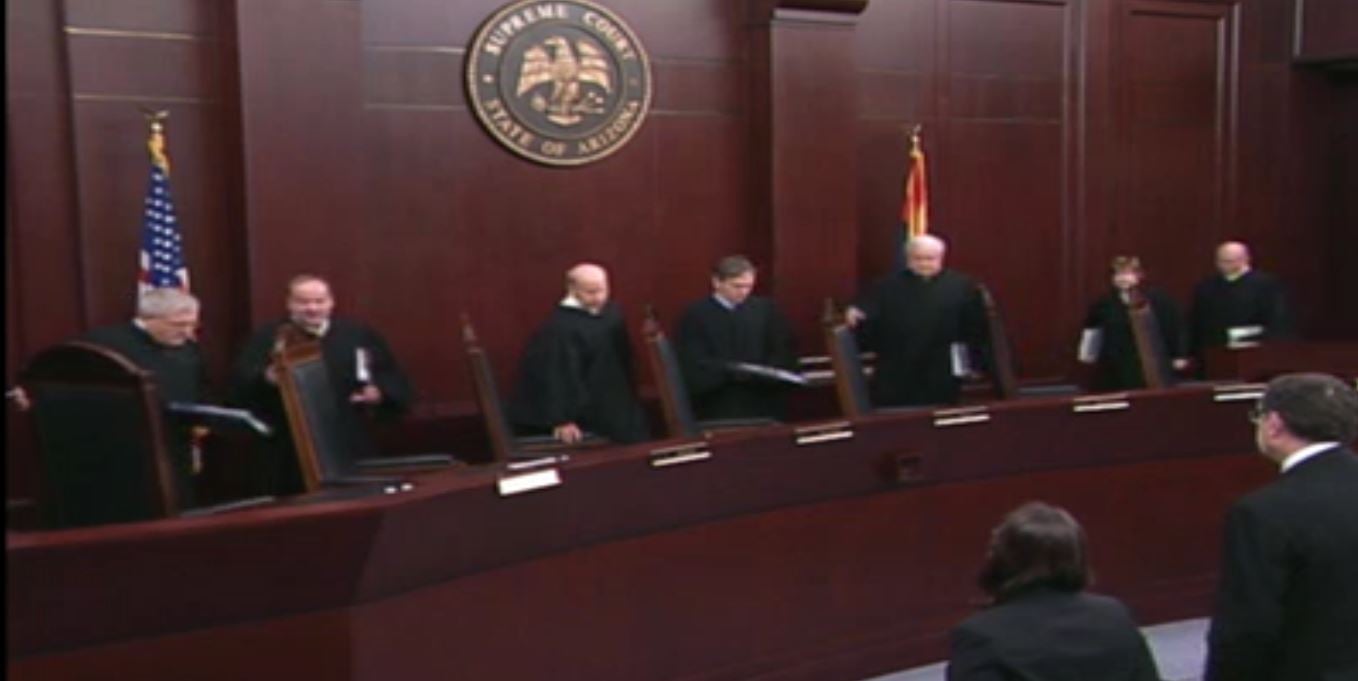WASHINGTON (CN) — Arizona courts kept jurors in the dark about its policy of denying parole to anyone sentenced to life in prison. Because it continued to do so even after the Supreme Court called it unconstitutional in 2016, a majority of the court awarded postconviction relief Wednesday to a man on death row for killing a police officer.
The 2016 case where the U.S. Supreme Court found that the state was violating defendants' civil rights was Lynch v. Arizona.
"Before Lynch," Justice Sonia Sotomayor explained for the 5-4 majority Wednesday, "Arizona courts held that capital defendants were not entitled to inform the jury of their parole ineligibility. After Lynch, Arizona courts recognize that capital defendants have a due process right to provide the jury with that information when future dangerousness is at issue. It is hard to imagine a clearer break from the past."
Arizona had abolished parole for all felonies in 1994, the same year that the U.S. Supreme Court decided in Simmons v. South Carolina that the trial court had a duty to let defendants inform jurors that a life sentence would be without parole.
It was about a decade later that John Montenegro Cruz was sentenced to death for the 2003 murder of Patrick Hardesty, a police officer whom Cruz shot five times during a confrontation about a hit-and-run accident.
The state portrayed Cruz as dangerous at his sentencing, even undermining a former prison warden who testified that Cruz was unlikely to be a danger in prison. Despite Cruz being ineligible for parole, the jury was given the option to sentence him to life imprisonment with a possibility of parole after 25 years. Cruz was instead sentenced to death.
Cruz argued the the failure of Arizona courts to let him inform the jury that he would be ineligible for parole violated Simmons, but the Arizona Supreme Court concluded that Simmons “did not apply” in Arizona. It held fast to that position, even after Lynch.
With Chief justice John Roberts and Justice Brett Kavanaugh tipping the scales for the Supreme Court's liberal wing, the majority was adamant Wednesday that Cruz faced a clear departure from the law.
"Under these unusual circumstances, the Arizona Supreme Court’s application of Rule 32.1(g) to Lynch was so novel and unfounded that it does not constitute an adequate state procedural ground," Sotomayor wrote.
Heading off arguments from the dissent, Sotomayor stressed later that "it makes no difference that Lynch did not alter federal law."
"The Arizona Supreme Court applied Rule 32.1(g) in a manner that abruptly departed from and directly conflicted with its prior interpretations of that Rule," she wrote. "Accordingly, the judgment of the Supreme Court of Arizona is vacated, and the case is remanded for further proceedings not inconsistent with this opinion."
Cruz was represented in Washington by Neal Katyal of the firm Hogan Lovells.
“We are so gratified by the U.S. Supreme Court’s decision, and its recognition of the unconstitutionality of what Arizona has been doing," Katyal said in an email Wednesday.
Arizona’s Chief Deputy Attorney General Joseph Kanefield argued for the state. A spokesperson for that office said they are reviewing Wednesday's ruling but otherwise declined comment.
Justices Clarence Thomas, Samuel Alito and Neil Gorsuch joined a dissent by Justice Amy Coney Barrett.
"The Court criticizes the 'novelty' of the Arizona Supreme Court’s law versus application-of-law distinction, as it does not appear in any other Arizona precedent," Barrett wrote. "A point that deserves emphasis at the outset: Novelty does not mean that a rule is inadequate merely because a state court announced it for the first time in the decision under review, and I do not understand the Court to suggest otherwise."
Barrett writes in conclusion that, were she sitting on the Arizona Supreme Court, she might agree with Sotomayor's argument that there has been a misinterpretation of the court's precedent.
"But that call is not within our bailiwick," Barrett stressed. "Our job is to determine whether the Arizona Supreme Court’s decision is defensible, and we owe the utmost deference to the state court in making that judgment. Cases of inadequacy are extremely rare, and this is not one."
While the Supreme Court took the rare step with Lynch of issuing a summary reversal to force Arizona's compliance with Simmons, about 30 prisoners have still been denied this right.
Subscribe to Closing Arguments
Sign up for new weekly newsletter Closing Arguments to get the latest about ongoing trials, major litigation and hot cases and rulings in courthouses around the U.S. and the world.








